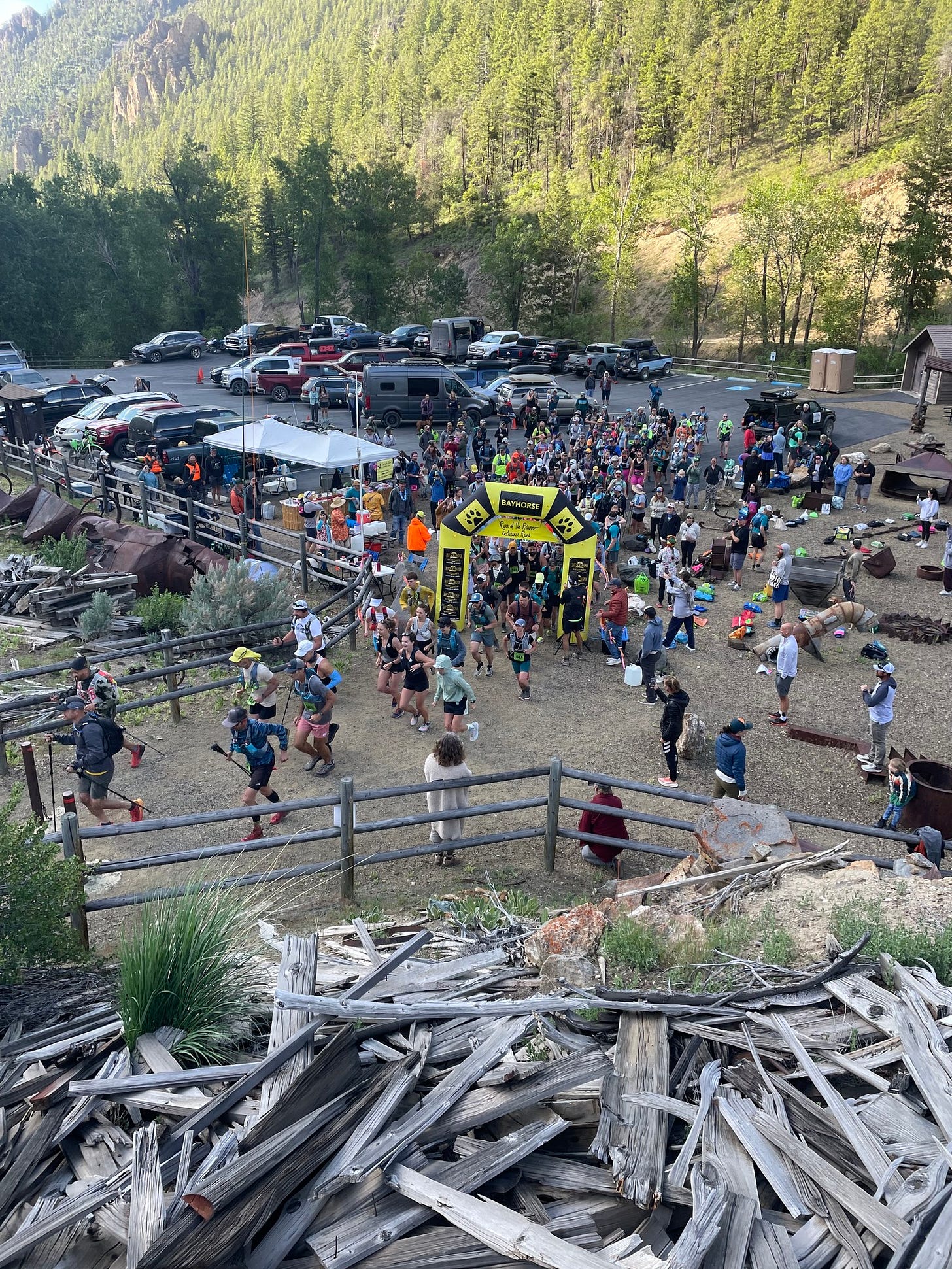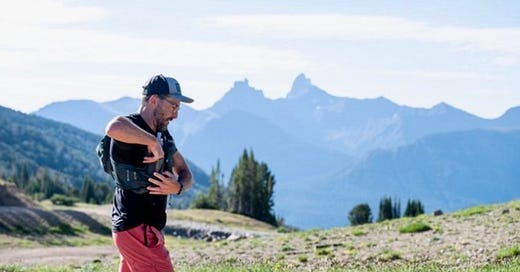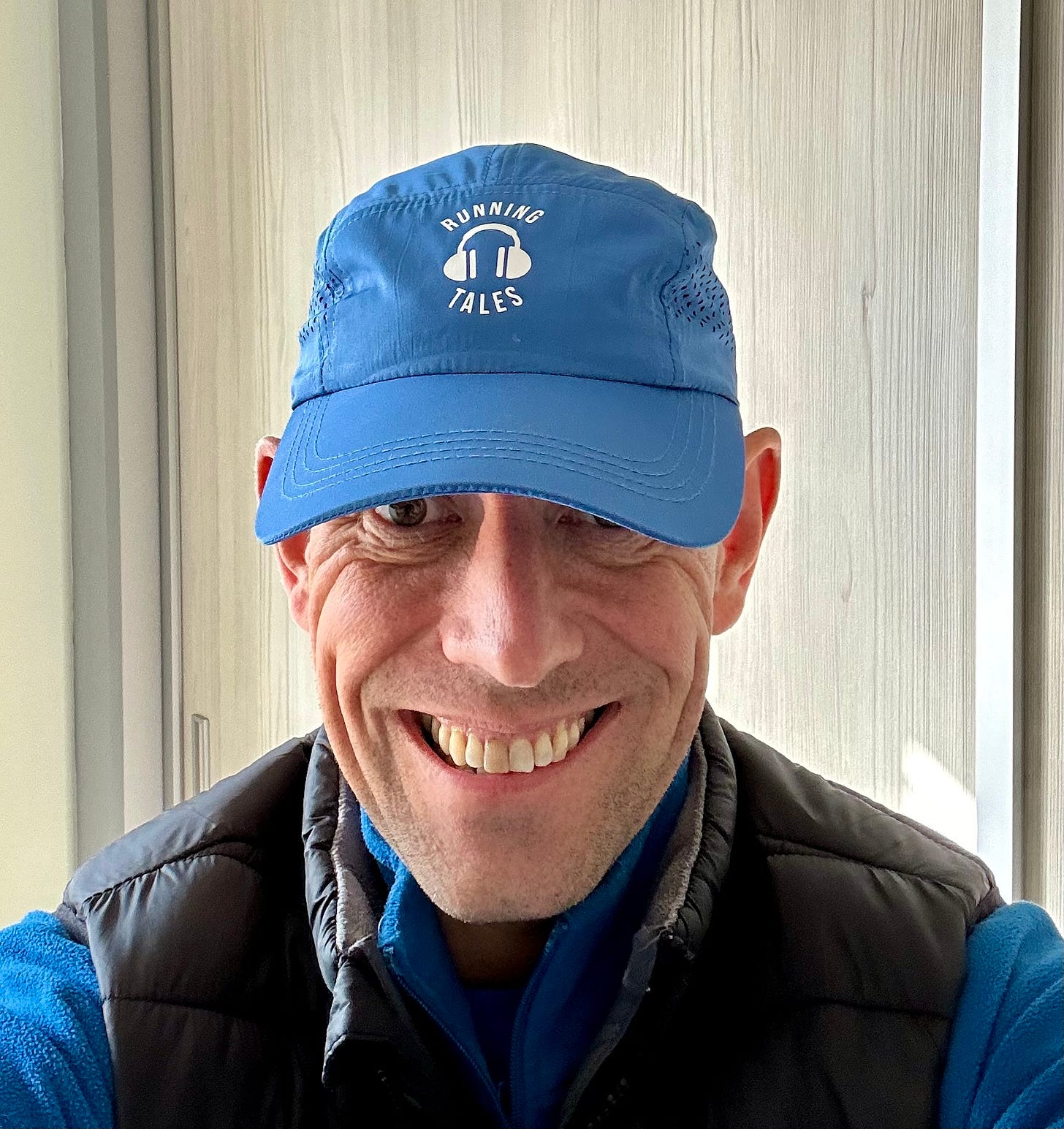'The world is full of things harder than running - but it can help you beat them'
When Joshua Ross was diagnosed with cancer he feared his life was over. The pain and pleasure he found while running reminded him he was alive.
As he completed another set of squats, wires dangling from his arms and strapped to life-saving equipment, Joshua Ross must have made an unusual sight.
While his self-imposed cancer recovery workouts, which also included running up and down his hospital room, would doubtless have got his heart pumping, they also kept some nervous nurses on their toes.
But while Joshua told Running Tales that some of the medical staff who oversaw his recovery from leukaemia were worried exercising while his white blood cell count was low could induce a heart attack, most were behind his determination to embrace a fitness regime that would eventually serve to be beneficial for both his mind and body.
And at the centre of this regime was running, a sport he had previously had little interest in.
Joshua’s life changed forever when he was diagnosed with Chronic Myeloid Leukaemia in January 2021. It would take 800 days - more than two years - before he achieved molecular remission.
It was during that recovery period that Joshua, who lives in the Adirondack mountains of upstate New York, started running every day - with the aim of hitting 100 in a row and encouraging others to realise they too could do hard things.
Once he achieved that goal, running a total of 104 consecutive days, he celebrated by competing in his first ever race.
But it was no local 5km. Instead, Joshua took on The River of No Return Endurance 55k in Challis, Idaho - complete with 10,000 feet of elevation gain.
While competing that race, and going on to finish a 55-miler as well as further trail marathons and ultras, is striking enough, what is really remarkable is the way running re-shaped Joshua’s mind.
From ‘preparing to die’ to finding discipline and meaning:
As with so many stories of life-changing feats, Joshua’s route to re-discovery didn’t start with resolve and resilience, but by being scared for his very life.
He said when he received his diagnosis his first emotion was fear. There were no immediate plans to run for 100 consecutive days or encourage others to confront their own pain head-on.
“I was scared,” he said, “but you have no choice but to be in the experience.
“I was basically preparing to learn how to accept mortality and how to die if that was going to be the case.
“Because whenever you hear cancer, that's your affiliation with the word; that this is the end.”
Fortunately, Joshua’s cancer was, in his own words, “highly treatable” and he is now hopeful of living a normal life expectancy. He said once he found that out he knew he had a future, something to cling on to.
Despite it becoming the sport which powered his recovery, running had not previously played much of a part in Joshua’s life.
An active lifestyle had seen him spending plenty of time in the gym, but it was only after he was diagnosed with leukaemia that he started to think about running as a serious proposition.
He told Running Tales that cancer had been one part of twin blows which had rocked his life - the other being navigating a divorce, something he said was in many ways “more traumatic and more confusing than dealing with cancer”.
He said: “It doubled down my fear because I had to learn how to navigate it all alone and think about how to deal with this sense of rejection and this massive identity change that divorce was compelling me into.
“And so I just turned to running as a way to cope, to ground me in the world and to give my life discipline and meaning.
“Because without that, I was just so focused on the fear all of the time.”
Joshua said that fear has never entirely gone away, particularly when it comes to regular check-ups with his oncologist, but that through running he has developed “a sense of confidence in my ability to handle whatever life is going to throw at me.
“It helped me go from the mindset of… I don't want to say a victim mindset and imply that people that have cancer or get cancer are victims, but it takes away that mindset that you are under attack and shows you still have the option to act in a way that is constructive.”
‘It was almost as if a voice told me to run. And I listened’:
Despite the psychological benefits it was set to bring, Joshua said his decision to embrace running “wasn’t rational”.
He sad his pledge to run 100 days in a row was the result of “being compelled by something greater than me.
“In a way, running was just a natural solution for me to take up in the face of all of this uncertainty and adversity.
“I wanted it to transcend my own life. I posted publicly on social media that I was going to run in solidarity with anyone, not necessarily cancer patients, to show people that you can be consistent, you can make a promise to yourself, and you can develop confidence through competency if you just stick with what you say you're going to do.”
He said once the challenge had been made public there was no going back. But what did surprise Joshua was just how much he got from it personally.
“There were days when it was exceptionally hard and I was learning all about how the body behaves when it's fatigued and how it adapts,” he said.
“It shocked me how much the body can adapt. You might think you're a strong athlete but you're not, you're pretty mediocre. Then as the body adapts, you expand into this next level.
“And that was really empowering. I don't know exactly [why I turned to running] other than I just had this hunch that I had to run. It was almost as if a voice told me to run. And I listened.”
‘This is not suffering. I'm choosing to do this. This is living’:
Joshua said that no matter how hard things get on longer runs now, it will never compare to the time he spent building his fitness back up during his recovery.
“It really puts things into perspective,” he said. “I never felt that on any of the runs I did that I was suffering.
“I don't like the use of that word for running, because you are choosing to do it. It is awesome to have that choice.
“One of my favourite runners is Cameron Hanes, who's a bowhunter and lives in Oregon. He's almost 60 but he just has a different mentality.
“I'll never forget when he said that my pain is a gift from God. And I thought, yeah, if you're in pain, then you are alive and you have something to be grateful for.”
Joshua said many of his early runs were marked by incredible physical and mental pain: “As soon as I got out of the hospital, I just commenced with walking. But at that time what I was dealing with was beyond fatigue. You have nothing left.
“I have never experienced a fatigue that is so total. I don't think that you could get there if you ran a thousand miles.
“Your energy leaves you and there's nothing you can do to get it back except to rest. When I left hospital, I wanted to continue running but I couldn't.
“My legs were swollen. They were enormous. I was dealing with a lot of oedema and some really bad rashes, and then terrible anxiety.
“I was grieving so much. My life was changing so much and I was navigating divorce.
“I would actually just emote on the trail and I would cry. The pain would take over my nervous system and it would get me out of my head, and allow my body to purge all of the fear and spiritual constriction that I was feeling. And I loved it.
“The physical pain became amazing. The more of it I could get by working harder, the stronger I would feel. And I never thought of it once as suffering.
“I'm here. It's a gift. This is not suffering. I'm choosing to do this. This is living.”
From cancer patient to ultra runner:

Joshua said he had been inspired to enter The River of No Return Endurance 55k by a desire to do something big and scary.
He had been running with a club in Livingston, Montana, and a fellow member had signed up for the 30k version of the race.
Keen to do something a bit more, but “terrified’ to go as far as the 100k event, Joshua had opted to take on the hardly insignificant 55k run.
“In retrospect, I'm glad that I didn't do the 100k for my first race,” he said. “I was following social cues from my run group. I literally knew nothing about the ultra running world.
“I had a friend for years - I still have - who has crushed ultras throughout his career, but I didn't know to what extent they existed everywhere. So, I just signed up and we went over together, four or five of us.
“I was scared to do that race. I had never run a race, not even a 5k. I'd never done a mile as a race, not even a July 4 mile or anything like that.
“And this event was across really mountainous country in Idaho.
“That being said, I had run for 104 days in a row, and then I had taken a day off and gone right back into training. So, I was fit.”
Joshua told Running Tales: “For the first 15 miles, I didn't run. I climbed really hard and really fast, and I stopped and I talked to a lot of people.
“I was just blown away. And I took so much from the experience. There's so much love and weird, freaky support in the ultra community.
“I was really only competing at that point with disease and the spiritual crisis that I was in. And so I was just feeding off of everyone during the race.
“I just got progressively happier and happier as it went on. I did stop, and I took time to make friends and to connect with people.
“And it was kind of fun to tell people my story and then dust them because I want to motivate them - to say, ‘I’m alright and if I can do this, if I'm out here, then you've got more. Let's see what you've got’.
Ultimately, Joshua was able to complete the event in six-and-a-half hours, a result that earned him first place in his age category.
He said: “I was really proud of the effort that I’d put in, but I was also exhausted.
“There had been a lot of emoting going on. I’d been spontaneously crying out there, thanking my grandmother, who was like a really central figure of my life.
“I’d been running through the woods, thinking about how she used to mop the floor on her hands and knees. I’d been thinking, ‘grandma, you work so much harder than I'm working right now’.
“And that was motivation for me. So, by the time that it finished, I didn't really even have anything left.
“It took me a while to understand what I had done. It took me a few days to recover and that was when I thought, ‘wow, that was impressive’ and it gave me the confidence I needed to go forward in life and to believe in myself again.”
Joshua said anyone who feels stuck in life for whatever reason can benefit by running.
“If you feel stuck and you then develop a better reputation with yourself through these actions that seem impossible, your whole perspective changes,” he said.
“Running does become a proxy for other hardships in life. Before I did anything like this, I was convinced that there was no way that I could. It was only by doing it that I realised it's actually not that hard.
“It's just showing, up and putting in the work.”
These days, Joshua still has to take a chemotherapeutic, a targeted type of therapy, which comes with a host of significant side effects.
He said he has tried to counter the impact of the drug by treating it as if it were no more than a vitamin tablet: “I wasn't going to think about what it may do to me. I was going to think about it - and its effects - as if it were a part of me, part of my DNA.
“That being said, fatigue was a major issue. And I don't mean just fatigue - as in being tired because I just ran 10 miles. It's like a weariness but I just continue to push through that.
“Initially, I wasn’t entirely sure if I was just harming myself further. But this was when I began to change into the person I am now. I just had this iron will.
“I was just going to see it through whatever.”
He said running gave his life a fresh trajectory and the confidence to reinvent himself as he navigated the tricky waters of cancer, divorce and searching for a new job all at the same time.
While being quick to acknowledge that a cancer diagnosis is a wake-up call that no-one wants or deserves, Joshua said facing the disease had been life-changing for him and often in a positive way.
“I think that was not just with me, but universally,” he added. “Many people will hit rock bottom and then change their life for the better.
“My first oncologist said to me, and I love this woman because she was a hard ass - just scientific and blunt, that this was my second chance at life.
“She said, ‘you need to go and live your life’. The cancer did change my relationship to myself. It made me get more clear on what I want out of life, how I'm going to spend my time, who I'm going to spend my time with, what I'm willing to tolerate, what I'm willing to do to navigate the world.
“It empowered me to stop trying to please others all the time, and to say no. Once you get a little glimpse of your mortality, you don't forget it.
“People, especially these days, write so much about stoicism and accepting death, and it's all abstract. They actually haven't walked that path. But once you've walked that path, you're more free.
“If I could say anything positive about being a cancer patient, it's that it taught me the value of following your curiosity in life and honouring that. Because today is not a prelude for tomorrow.
“Cancer will make you reflect on how can I develop into the most fully dilated human being that I can be.”
The importance of embracing the present moment:
Joshua’s cancer is currently in remission, but he lives with the constant threat of its returning one day.
He told Running Tales that distinguishing between threats his body may face and the pressure and pains of everyday life has been one of his biggest challenges.
“Early on, your brain interprets every little bump in the road as a potential catastrophe and you get stuck in that neural loop of worrying,” he said.
“For instance, six weeks ago I had a bloody nose. I had a lot of those during the early days of my treatment and my brain was unable to tell the difference between whether it was just an ordinary day, where my nose was dry because it's the dead of winter here in the Adirondacks, or something more serious.
“My brain would immediately slip back into panic. Part of the practice of acceptance is you have to work with the truth that you are out of control.
“I've got better and I'm able to not interpret bumps in the road negatively, to not see every experience as a reflection of my character, bad luck, or my disease.
“But it is really challenging. That has been the biggest mental health obstacle. I want to be in a state of abundance, especially around this disease. If I'm not, then the fear takes over and I worry about getting sick and leaving the people that I love and not being able to compete as an athlete, and living in a room in a hospital for an undetermined length of time and going through surgeries and pain.
“I try to keep my mind in the present moment and in the abundance of the moment, because that is a skill and it is a hard-earned skill.
“It is so much harder than running. But running will help you be there.”
Support Running Tales:
Please help us keep producing Running Tales across Substack and in podcast form:
Also on Running Tales:
Check out our merchandise:
The merch is better than the model.
Be a part of the Running Tales revolution with our new merchandise range.
We’ve got buffs, caps, cups, t-shirts and hoodies - why not complete your next run as an everyday runner by doing extraordinary things?












